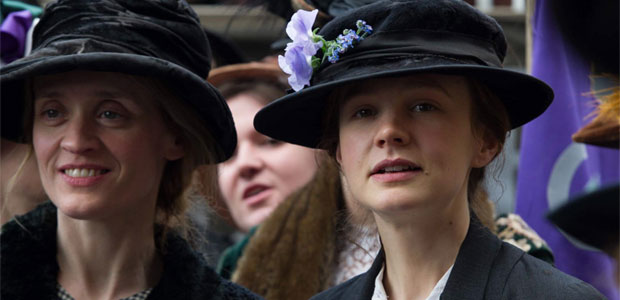In the early 20th century, the events that unfolded around the women’s suffrage movement in the United Kingdom posed a powerful moral dilemma: how far is too far when you’re backing a cause that you’re entirely convinced is important for the world? Is there justification for putting a person in harm’s way when acting in support of something that’s much, much bigger than any one person? This is obviously a serious debate that echoes throughout history within all different social movements, but it’s a fascinating issue when perceived in the light of what had to happen in order for women to receive the inalienable right to vote. It’s challenging subject matter, but that just makes it all the more impressive how it’s handled in director Sarah Gavron’s new film Suffragette.
The film navigates real history through the story of a fictional character surrounded by portrayals of real people, but in accessing the truth of what happened during the women’s suffrage moment in England, it crafts a narrative that features a brave and self-sacrificing activist whom the audience occasionally finds themselves legitimately questioning. Again proving that she is one of the best actresses currently working and a top female lead, Carey Mulligan puts in another tremendous performance – very much carrying the heavy and complex story – and solidifies the film as a strong and powerful period piece.
Based on an original screenplay by Abi Morgan, Suffragette begins with a look into the life of Maud Watts (Mulligan), a young wife and mother who has spent almost her entire life working in the harsh conditions of a giant laundromat, and essentially lives for the love of her young son, George (Adam Michael Dodd). Initially she wants to part in the “Votes For Women” movement, freaked by the sight of activists throwing stones through windows, and married to a conservative husband (Ben Whishaw), but that changes when circumstance leads her to officially testify before Parliament about what it’s like to be a woman living in England. Through this event, it finally hits home just how bad the misogynistic system is, and when she learns that her testimony ultimately meant nothing, she begins to align more strongly with the suffragette cause.
Joining the movement led by Emmeline Pankhurst (Meryl Streep, in a one-scene role) – which promotes the idea of civil disruption in promotion of social change – Maud teams with a group of other women (Helena Bonham Carter, Natalie Press, Anne-Marie Duff) to do what they can to try and gain recognition by taking action like cutting communication lines and destroying mailboxes… regularly getting arrested in the process. This starts to have massive consequences for Maud, as not only her professional and home life completely change, but she finds herself put in the crosshairs by Inspector Arthur Steed (Brendan Gleeson), a detective assigned the job of stopping the perceived terrorist attacks in support of the suffragette movement.
The cast and the film up and down is fantastic, and every actor does an exceptional job (even those who are in roles on the one-dimensional side), but it’s really Carey Mulligan’s performance that makes the movie worth catching. Abi Morgan’s script gives Maud a tremendous arc of passion-fueled ups and devastating downs, and the actress executes the evolution with deeply felt emotion and pathos. There are certainly times when you question Maud’s actions and whether or not they truly are for the greater good, but the consistency in the character and the performance is what keeps you invested.
Beyond capturing the honest emotional state of 1912 England, and looking at two sides of a historically controversial issue, Sarah Gavron and her production team do a fantastic job creating both a convincing period look as well as a thematically-tinged atmosphere. The London that’s portrayed in the film is a place where you’d never want to live, not only due to its backwards politics, but because it’s painted as a cold, dark and oppressive place. The movie doesn’t exactly pop in terms of camera movement and style, but the production design is absorbing and really brings you into the world.
Suffragette is coming out in a season well-known for its period-set political dramas, and while it’s not overtly a stand-out in the pack, it is certainly an engaging and well-made movie about a very important and controversial time in history that earns its fiction-driven approach. You’ll be entertained by another brilliant Carey Mulligan performance, and also will learn about issues that are still depressingly relevant today – which is a good amount to ask for out of a movie-going experience.
Your Daily Blend of Entertainment News

Eric Eisenberg is the Assistant Managing Editor at CinemaBlend. After graduating Boston University and earning a bachelor’s degree in journalism, he took a part-time job as a staff writer for CinemaBlend, and after six months was offered the opportunity to move to Los Angeles and take on a newly created West Coast Editor position. Over a decade later, he's continuing to advance his interests and expertise. In addition to conducting filmmaker interviews and contributing to the news and feature content of the site, Eric also oversees the Movie Reviews section, writes the the weekend box office report (published Sundays), and is the site's resident Stephen King expert. He has two King-related columns.

